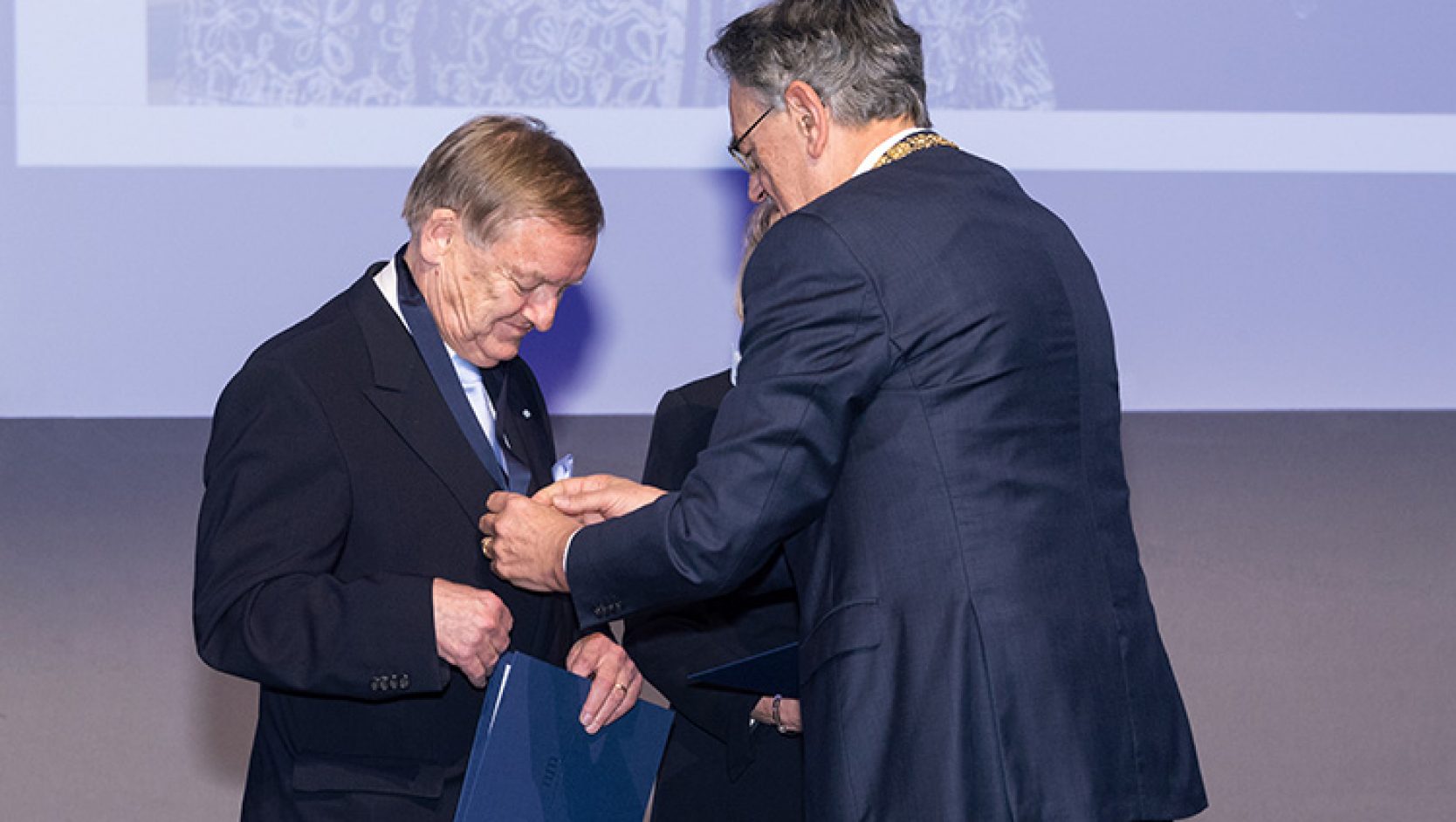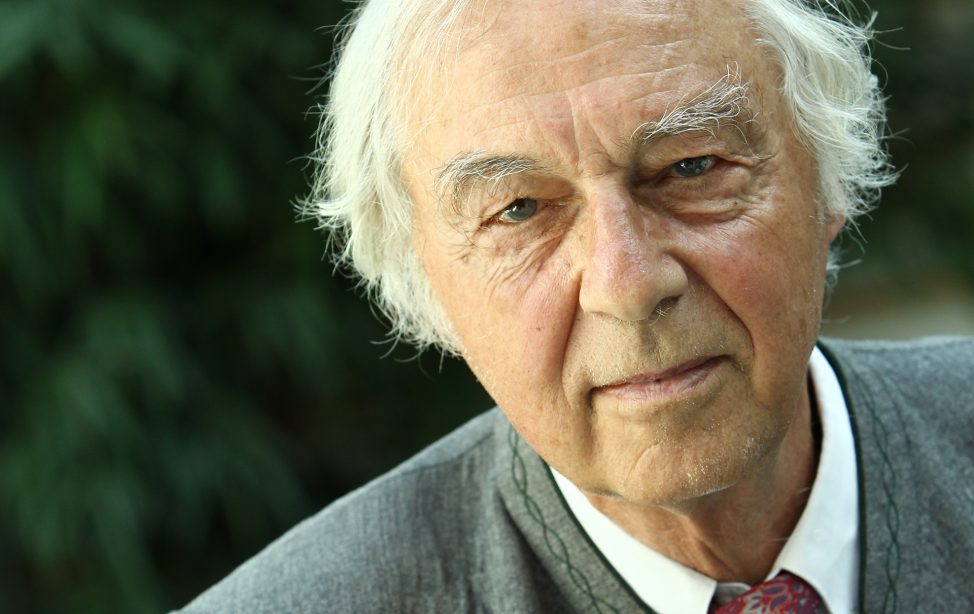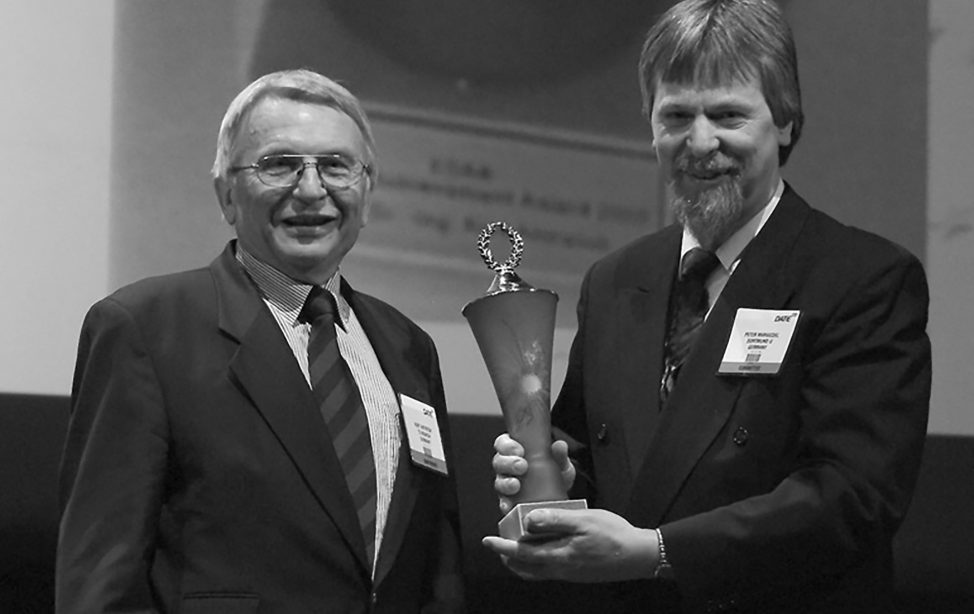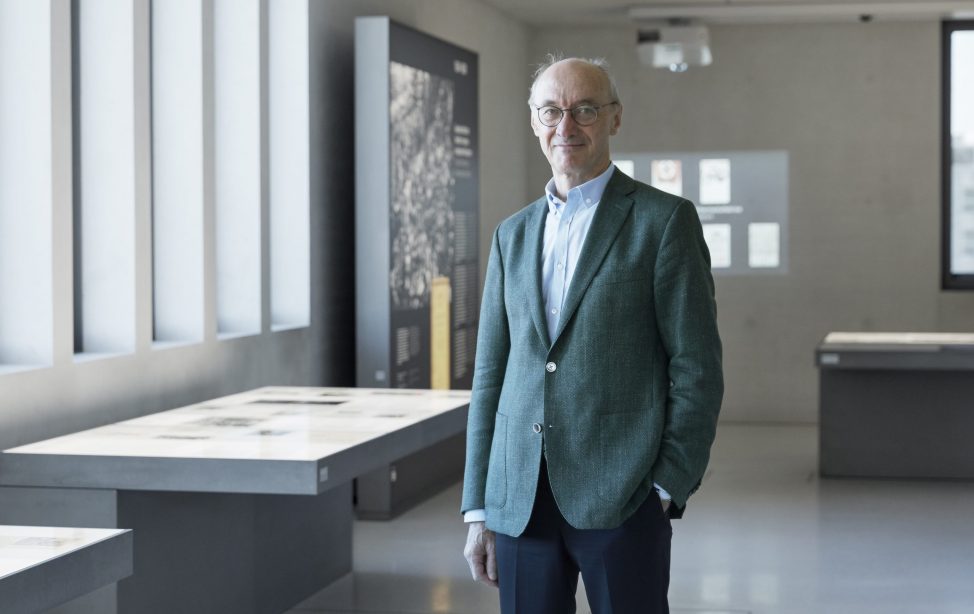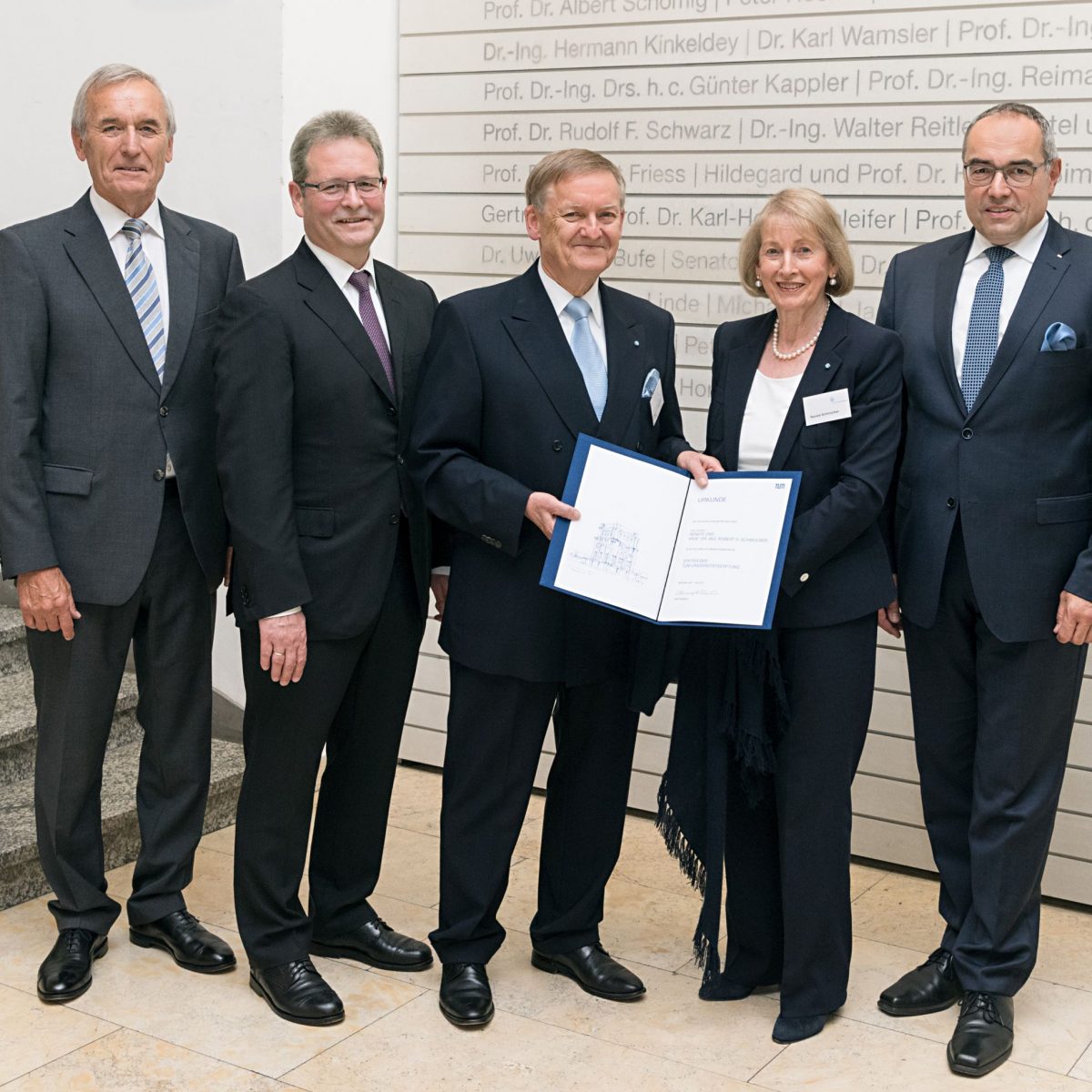
Robert Schmucker and his wife Renate are also committed to the TUM University Foundation (Picture: Uli Benz/TUM).
TUM Honorary Senator Robert Schmucker
“I Am Grateful for My Life”
And he shows you how to succeed: “I always tell the students in my lectures: The goal is a 1.0.” Satisfactory is not enough for him. His goals are always ambitious, his projects challenging. It’s all about achieving his goals, and “as quickly as possible,” he adds, “because the only thing we don’t have is time.”
Robert Schmucker completed his education in exactly the same way: his diploma in 1967, a doctorate three years later, in between a stint at NASA in the USA, and his habilitation in 1974. A broad-scale education was important to him: As one of the few rocket experts, he has worked with liquid-propellant, hybrid-propellant, and solid-propellant rockets. This is also a reason why he is one of the world’s most renowned rocket experts.
PRACTICAL EXPERIENCE DURING HIS STUDIES
Alongside his studies, he always wanted to work in a hands-on way – which is why he founded WARR as a student in 1962 and headed it until 1974: The “Scientific Workgroup for Rocketry and Spaceflight” has always been making practical projects possible in the field of spaceflight, and Robert Schmucker is proud of the group to this day: “It’s great that it has established itself at the university.”
In 1974, the WARR students – still together with Robert Schmucker – launched the first German hybrid rocket; within the group, the Hyperloop project group was also founded in 2015, which today celebrates one success after another, or now the start-up Isar Aerospace, which began producing launch vehicles this year. “These are all my boys and girls (Buam and Madln) – a beautiful thing!”
SPACE TRAVEL HAPPENS AT THE EDGE OF WHAT’S POSSIBLE.
His challenges were “the disasters when your back is against the wall” and, for example, when you watch how a rocket engine explodes. After that, you have to find out what went wrong so that you can do it better the next time. “Spaceflight happens at the edge of what’s possible,” says Robert Schmucker. “Things go wrong all the time, and then you have to keep on going anyway.”
IF I’M DOING WELL, I NEED TO LOOK AT GIVING SOME OF THAT AWAY.
CONNECTION TO TUM
He is very grateful for his life, he says. And that is also one reason for his great commitment. “If I’m doing well, I need to look at giving some of that away,” he says. That’s why he and his wife have established two foundations and also generously supported the TUM University Foundation, because “TUM is very close to my heart.”
For Robert Schmucker, it was always clear that he would study at TUM. His brother had already studied electrical engineering at what was then TH Munich (TH München Elektrotechnik), so there was no other option for his parents than to send their younger son there too. “I’m a mechanical engineer through and through with an additional focus on chemistry,” says Robert Schmucker, emphasizing, “so that’s exactly what you need for rocket technology and aerospace, the way I see it.”
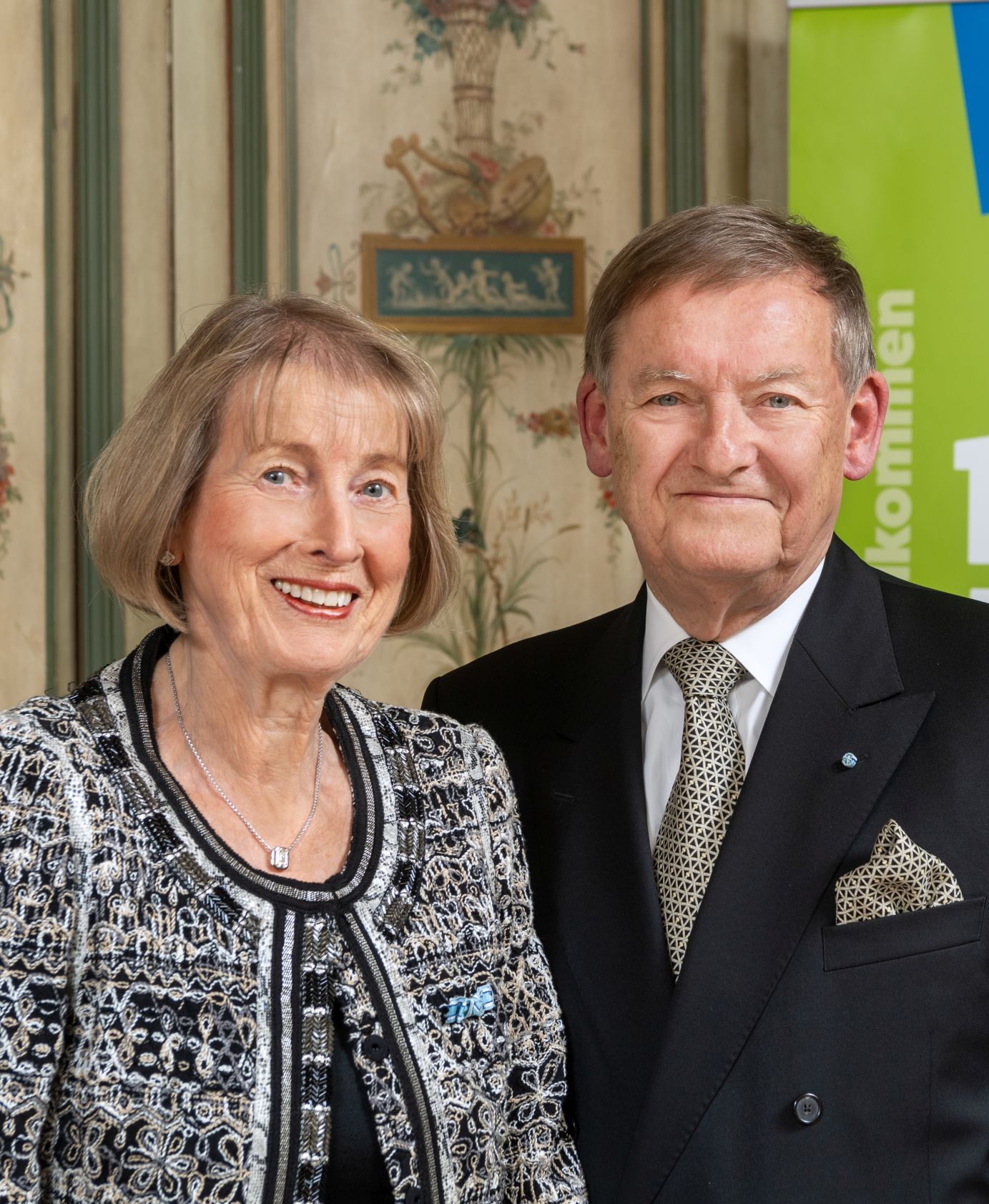
Renate Robert Schmucker (Picture: Andreas Heddergott/TUM).
Prof. Dr. Robert Schmucker
Degree in mechanical engineering in 1967, PhD in 1970
Robert Schmucker studied mechanical engineering at TUM and earned his doctorate in rocket propulsion systems in 1970. During his studies, he founded WARR – Wissenschaftliche Arbeitsgemeinschaft für Raketentechnik und Raumfahrt (Scientific Workgroup for Rocketry and Spaceflight) in 1962, which still today enables students to gain practical experience alongside their studies. He worked at NASA in the USA, then in Germany for DLR in Lampoldshausen and in the 1980s as head of development at Bayern-Chemie GmbH. Since 1981, Robert Schmucker has been teaching as an adjunct professor at TUM’s Chair of Astronautics in Garching. In 1992, he founded Schmucker Technologie in Munich, which also advises NATO on rocket/missile issues, among other things. From 1995 to 1998, he was a member of the UN inspection team in Iraq.
Together with his wife Renate, Robert Schmucker is engaged in many areas: In 2010, the couple founded the “Findelkind Sozialstiftung”, and they are also actively involved as TUM University benefactors. Together with his wife, he was awarded the Bavarian Order of Merit in 2016 and was appointed as TUM honorary senator in 2018.
Robert Schmucker lives with his wife in Munich, and he has two children and five grandchildren. He is passionate about the landscape paintings of the Munich artist August Seidel, for whom the couple has also established a foundation.
You can also read an in-depth interview with Robert Schmucker in REISSWOLF, der Zeitschrift der Fachschaft Maschinenbau (magazine of the mechanical engineering student body).
